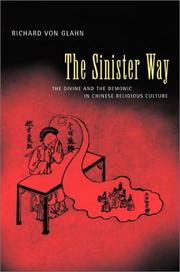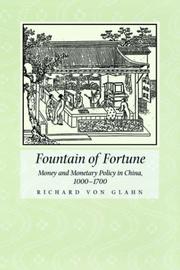| Listing 1 - 2 of 2 |
Sort by
|

ISBN: 9786612356834 0520928776 1282356836 1597349011 9780520928770 141752555X 9781417525553 0520234081 9780520234086 Year: 2004 Publisher: Berkeley University of California Press
Abstract | Keywords | Export | Availability | Bookmark
 Loading...
Loading...Choose an application
- Reference Manager
- EndNote
- RefWorks (Direct export to RefWorks)
The most striking feature of Wutong, the preeminent God of Wealth in late imperial China, was the deity's diabolical character. Wutong was perceived not as a heroic figure or paragon of noble qualities but rather as an embodiment of humanity's basest vices, greed and lust, a maleficent demon who preyed on the weak and vulnerable. In The Sinister Way, Richard von Glahn examines the emergence and evolution of the Wutong cult within the larger framework of the historical development of Chinese popular or vernacular religion-as opposed to institutional religions such as Buddhism or Daoism. Von Glahn's study, spanning three millennia, gives due recognition to the morally ambivalent and demonic aspects of divine power within the common Chinese religious culture.
Demonology --- Demonology, Christian --- Demons --- Evil spirits --- Spirits --- Spiritual warfare --- History. --- China --- Religion. --- afterlife. --- ancestors. --- ancient china. --- china. --- chinese history. --- chinese jia jiao. --- chinese religion. --- christianity. --- comparative religions. --- cult. --- death. --- deity. --- demon. --- demonic. --- demonology. --- demons. --- divine power. --- divinity. --- folk belief. --- folk religion. --- folklore. --- ghosts. --- goblins. --- god of wealth. --- gods. --- greed. --- han cult. --- imperial china. --- lust. --- nonfiction. --- popular religion. --- possession. --- religion. --- religious culture. --- salvific religion. --- shanxiao. --- sin. --- spirit of the dead. --- spirituality. --- supernatural. --- vernacular religion. --- vice. --- wutong cult. --- wutong.

ISBN: 0520917456 0585108463 9780520917453 9780585108469 9780520204089 0520204085 0520204085 Year: 1996 Publisher: Berkeley, Calif. University of California Press
Abstract | Keywords | Export | Availability | Bookmark
 Loading...
Loading...Choose an application
- Reference Manager
- EndNote
- RefWorks (Direct export to RefWorks)
"In this study, the first of its kind in English, Richard von Glahn offers a definitive analysis of the economic, political, and social history of money and monetary policy during the Song, Yuan, Ming, and early Qing dynasties. Von Glahn departs from previously held ideas about the effects of money and international trade in bullion on the rise and decline of dynastic power in China. His study also links Chinese monetary history to changing trends in money-use and trade in gold and silver in Asia, Europe, and the Western Hemisphere. He argues that China's shift to a silver economy had a decisive influence not only on the growth of a market economy in China but also on the formation of a global economy in the early modern era."--BOOK JACKET. "Exhaustively researched from archival sources, Fountain of Fortune examines critically the many facets of China's domestic and foreign monetary policy, including the foundations of Chinese monetary theory."--Jacket.
Money --- Monetary policy --- Moneda --- Monetary policy. --- Circulation of money. --- Ming dynasty. --- Monnaie --- Politique monétaire --- Finance --- Business & Economics --- Monetary management --- Economic policy --- Currency boards --- Money supply --- History. --- Historia. --- Histoire. --- History --- chinese monetary history. --- classic. --- common chinese religious culture. --- deitys diabolical character. --- divine power. --- embodiment of greed and lust. --- emergence and evolution of wutong cult. --- fascinating. --- historical development of chinese popular religions. --- late imperial china. --- maleficent demon. --- preeminent god of wealth. --- preyed on weak and vulnerable. --- wutong cult.
| Listing 1 - 2 of 2 |
Sort by
|

 Search
Search Feedback
Feedback About UniCat
About UniCat  Help
Help News
News